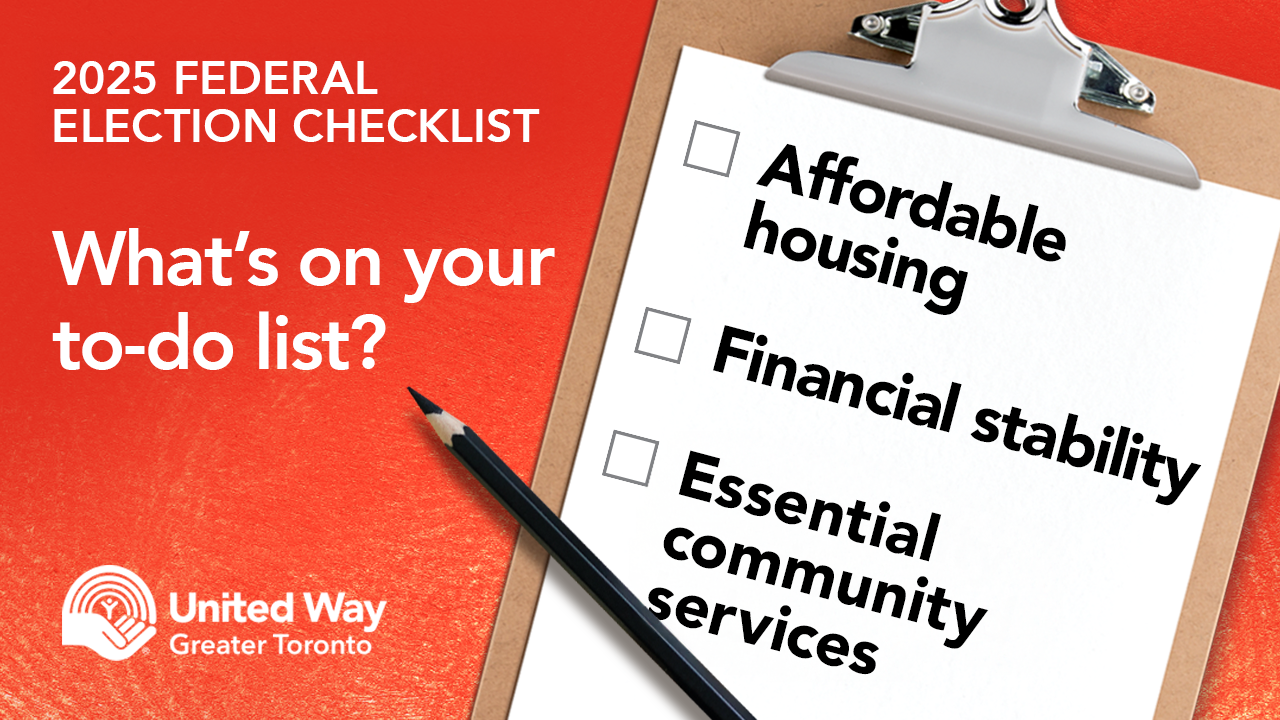
United Way Greater Toronto’s work fighting poverty, improving social conditions and driving systems change for more equitable communities has always been collaborative. Government at all levels are among our most vital partners, holding the keys to change that becomes enshrined in policy and truly transformative.
This federal election will be decisive for our country as Canadians go to the polls looking for strong leadership on the challenges we are all facing, now intensified amid unravelling trade agreements and an uncertain economic future.
Your vote is your chance to make a difference. We encourage you to take this opportunity to engage in shaping our collective course. Read party platforms, talk to candidates and, as you share your thoughts on the issues most important to you, please keep in mind some of the solutions we support:
Essential community services
When the economy takes a hit, it is the most vulnerable who feel it first. We saw this during the COVID-10 pandemic, and we will see it again during these trade wars. A strong community services sector is the best defence against economic uncertainty. When governments invest in non-profits, community programs and social supports, they help keep people housed, employed and connected.
- Governments must include the community and social services sector in any stimulus spending to ensure our social safety net remains strong when it is needed most.
- Non-profits are the first to step up in a crisis, making sure families have food on the table, a place to sleep and the help they need to get through tough times. United Way Greater Toronto has deep community roots and a trusted track record of deploying resources efficiently and effectively, ensuring that stimulus spending reaches the communities that need it most. This is what we did during the pandemic, delivering the federal government’s Emergency Community Support Fund to help community service organizations meet urgent needs and later, through the Community Services Recovery Fund.
- Government can also boost Canada’s productivity by building vital community assets such as Community Hubs, co-op and non-profit housing. This provides local jobs, helps community agencies benefit from the efficiencies of co-location and shared services and increases affordable housing options.
Financial stability
Last year in Toronto alone, client visits to food banks ballooned to 3.49 million, a million more than the year before. Food banks have become commonplace, not just for those on inadequate fixed incomes, but for more households with someone in full-time employment. This is especially true when the minimum wage of $17.20/hour is a full $9/hour below the actual costs of living in the GTA: $26/hour, according to the Ontario Living Wage Network. We know that tariffs risk deepening financial insecurity, especially for individuals and communities already facing systemic barriers — including many Indigenous peoples, low-income workers, Black and other racialized families, 2SLGBTQ+ communities and people with disabilities. Without action, these communities could bear the brunt of rising costs, job losses and service cuts — further deepening already stark inequalities.
- Investing in income supports not only helps individuals and families meet their basic needs — it also strengthens the broader economy. Every dollar spent on direct income assistance stimulates local spending, supports local businesses and contributes to community stability. Over time, it also leads to cost savings in other areas, such as healthcare, homelessness services and emergency response systems by addressing root causes before they escalate.
- For Canadians living with a disability, enhanced funding is needed to deliver an inflation-indexed Canada Disability Benefit to prevent and eradicate poverty among people with disabilities.
- With increased fears of job losses, comprehensive Employment Insurance (EI) reforms that require lower qualification thresholds and offer higher rates of benefits for longer will provide a stronger, fairer and more agile EI system, including more access for self-employed workers.
Affordable housing
The rising cost of housing is outstripping all budgets, with devastating impacts on families living on low incomes. As waiting lists for subsidized housing become longer, more people are on the streets and in park encampments, where they face even greater precarity. The non-profit and community housing sectors are important partners in building and maintaining the housing we need. Building on the recommendations in Bringing Affordable Housing Home, our action plan for housing stability, the federal government can help address the affordable housing crisis by:
- Addressing and prioritizing persistent housing and homelessness challenges faced by Indigenous Peoples through a dedicated strategy, programs and supports developed and implemented in partnership with Indigenous leaders, diverse Indigenous communities, housing providers and all levels of government.
- Investing in and improving greater access to financing for the development of affordable and deeply affordable homes across Ontario.
- Preserving aging private market affordable housing stock, including through non-profit and co-op housing sector acquisition.
- Making surplus lands and assets available to non-profit and co-operative housing providers to build deeply affordable and supportive housing options.
For practical information on how and where to vote, please visit the Elections Canada website.
You can also enter your postal code on the Elections Canada website and click on ‘My voter information’ to get more information on the candidates in your riding.
This election don’t miss out on your chance to learn where candidates stand on the critical social and economic issues affecting our communities. Let’s play a part in making the GTA better for all – any way we can.